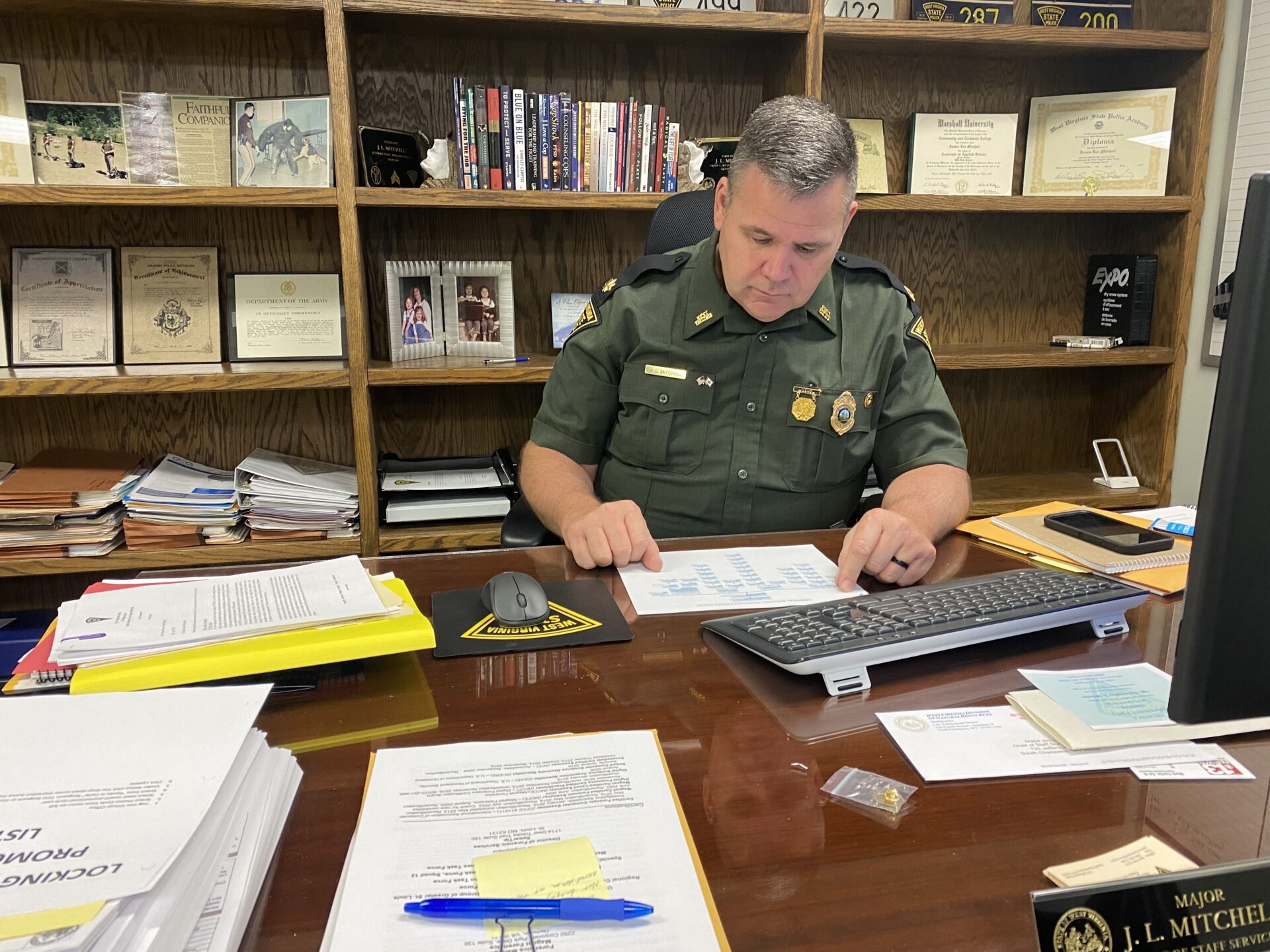In his new position as West Virginia State Police Chief of Staff Services, Maj. James Mitchell acts as financial CEO and oversees the cadet academy, public relations, legal relations and a dozen or so other departments. The law enforcement veteran and Beckley native says he wanted to be a trooper ever since he saw the men and women in green when his farming family took him to the state fair as a youngster.
“I joined the state police in January of 2000, that was 23 years ago,” Mitchell said. “I was a city police officer before that in Beckley for about six years, and I was in the military before that. So I’ve got 33 years this year as a law enforcement officer.”
Mitchell said when he learned of the hidden camera in the women’s locker room and all the allegations of wrongdoing, it broke his heart.
“It affects every single person wearing this uniform,” he said. “Not just the state police, it affects other agencies as well, because the public will group law enforcement together, regardless of the color of the uniform. It was heartbreaking not just to me, but to so many of the people in law enforcement that I’ve talked to. It’s happened, we can’t deny that. But we can make sure it doesn’t happen in the future.”
Mitchell said cadet training at the State Police Academy evolves over time and changes in social culture. He said the loss of integrity by a few in the department makes balanced training even more important.
“Number one, we’re honest about it,” Mitchell said. “We expressed to them the importance of Stress Inoculation Training. So, we’re going to talk about the balance of it. We try to make sure at the beginning of training, that they can respond and function under a life or death, high stress environment. Then it changes more to a mentoring style of training the mind when it comes to criminal work. They gain understanding of criminal investigations, crime scene investigation, traffic investigation, and officer survivability techniques. So, there’s a great balance of training, and it fluctuates.”
Mitchell says from a day-one cadet to a retiree, troopers vow to maintain the core values of respect, integrity, courage, compassion, honesty, and justice.
“I think their value system is very important,” he said. “It will hold them true throughout their career, and then they won’t have problems like we’ve experienced. Unfortunately, what some have done is a violation of the core values.”
Mitchell said he could not discuss the active investigations now underway involving alleged casino theft, the hidden camera and destruction of evidence, alleged rape and improper conduct – or pending litigation by a growing number of women law enforcement officers concerned with possible violations while training at the academy. He was asked, “Was there a problem with a few bad apples, as Gov. Jim Justice has said, or was there a counterculture uncovered that put integrity on the backburner?”
“All of the things that you ask, I’m sure, are being looked at in the investigations,” Mitchell said. “There will come a day though, we hope it to be sooner than later, where we’ll have all the facts of this and we’ll be able to openly discuss it.”
He explained that the wholesale leadership and personnel changes made by new Superintendent Jack Chambers come with the qualification of choosing your own top office staff.
“When a superintendent comes into office, he has by code, the ability to choose his own senior staff,” Mitchell said. “Anything above lieutenant – captain, major, lieutenant colonel, are all appointed positions by the superintendent.”
He said the State Police are working closely with Homeland Security and Gov. Jim Justice’s office, but all final decisions are made independently by Chambers.
“They trust him to do this job, that’s why they appointed him,” Mitchell said. “They trust him to make the right decisions, and they’re being very respectful and very supportive of him.”
Mitchell said 99 percent of the agency, civilians and sworn personnel alike, are excellent, hardworking, compassionate people that really want to do a great job and want to arrest those who are doing wrong and protect the innocent.
He said from what he’s heard, the rank and file, boots-on-the-ground troopers, female and male, still have the public trust and respect.
“Most people here support law enforcement, support the military, they’re very patriotic, they love their country. So we’ve been very blessed when it comes to good people,” Mitchell said.
Mitchell said for the future of the West Virginia State Police, it’s about societal adapting while committing to those core values.
“We want to continue to change where changes are necessary, continue to stay with our principles that we know are true and move forward to continue to provide a service that’s exemplary,” Mitchell said.
